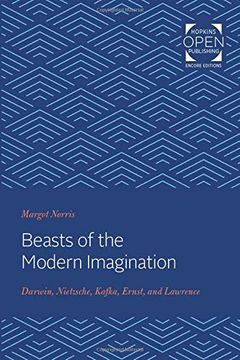Compartir
Beasts of the Modern Imagination: Darwin, Nietzsche, Kafka, Ernst, and Lawrence (en Inglés)
Margot Norris (Autor)
·
Jhup
· Tapa Blanda
Beasts of the Modern Imagination: Darwin, Nietzsche, Kafka, Ernst, and Lawrence (en Inglés) - Margot Norris
$ 51.03
$ 63.79
Ahorras: $ 12.76
Elige la lista en la que quieres agregar tu producto o crea una nueva lista
✓ Producto agregado correctamente a la lista de deseos.
Ir a Mis ListasSe enviará desde nuestra bodega entre el
Viernes 14 de Junio y el
Lunes 17 de Junio.
Lo recibirás en cualquier lugar de Estados Unidos entre 1 y 3 días hábiles luego del envío.
Reseña del libro "Beasts of the Modern Imagination: Darwin, Nietzsche, Kafka, Ernst, and Lawrence (en Inglés)"
Originally published in 1985. Beasts of the Modern Imagination explores a specific tradition in modern thought and art: the critique of anthropocentrism at the hands of "beasts"—writers whose works constitute animal gestures or acts of fatality. It is not a study of animal imagery, although the works that Margot Norris explores present us with apes, horses, bulls, and mice who appear in the foreground of fiction, not as the tropes of allegory or fable, but as narrators and protagonists appropriating their animality amid an anthropocentric universe. These beasts are finally the masks of the human animals who create them, and the textual strategies that bring them into being constitute another version of their struggle. The focus of this study is a small group of thinkers, writers, and artists who create as the animal—not like the animal, in imitation of the animal—but with their animality speaking. The author treats Charles Darwin as the founder of this tradition, as the naturalist whose shattering conclusions inevitably turned back on him and subordinated him, the rational man, to the very Nature he studied. Friedrich Nietzsche heeded the advice implicit in his criticism of David Strauss and used Darwinian ideas as critical tools to interrogate the status of man as a natural being. He also responded to the implications of his own animality for his writing by transforming his work into bestial acts and gestures. The third, and last, generation of these creative animals includes Franz Kafka, the Surrealist artist Max Ernst, and D. H. Lawrence. In exploring these modern philosophers of the animal and its instinctual life, the author inevitably rebiologizes them even against efforts to debiologize thinkers whose works can be studied profitably for their models of signification.

